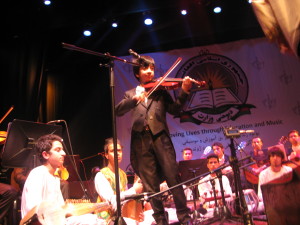
Lauryn Oates, for The Huffington Post
November 16, 2015
Paris is bleeding. In this latest wave of violence, some news reports described the targeted locations of the attacks as “random.”
The targets were anything but random. Islamic terrorism is a form of fascism, and it targets the symbols of modernity and liberalism. Free citizens enjoying their lives on a Friday night, people watching from the iconic Parisian café terraces, indulging in food and wine; these are spaces for true Epicureans, those who favour happiness over divinity — the antithesis of the Islamic State’s worldview. Such places are selected with surgical precision.
These are places that symbolize a free society, where individual liberty and the pursuit of pleasure and welfare are prized. They strike at the core of the Islamic State’s ideology — and ideology is what this violence is about — not about territory or oil or money. This is a war of ideas and France is rich allegory for the ideas that terrorists object to.
The French Government, since 1970, has operated the Institut Français d’Afghanistan, in a beautiful, light-filled modernist building in the heart of Kabul. Next door is a high school where Afghan youth study in French, the Lycée Isteqlal. Afghans take French language classes at the Institute, or browse its well stocked library, or gaze as the artwork that regularly rotates through the lobby’s gallery space.
The IFA has perhaps Afghanistan’s best auditorium, filled with a prolific schedule of events. In a typical week, Afghans and foreigners would rub shoulders at political debates, or listen together to lectures or poetry readings. I recall a hope-filled crowd applauding the Afghan children who study at the Afghanistan National Institute of Music performing both classical Afghan and classical Western music. Another night I listened to Parisian “racontante” Muriel Bloch who, prop-free on an empty stage, captivated her audience through that purest form of entertainment, a good story. On nights like this, we forgot about the world outside, about the Afghanistan of war and poverty and suffering.
Over the years, I attended an eclectic array of events at the IFA, but certainly the most memorable was when French hip-hop dance group, Pockemon Crew, came. For two weeks before the show they trained a group of Afghan youth who performed first, followed by Pockemon Crew, then the two together. As Afghan and French dancers tumbled around the stage together, doing electrifying back flips and perfectly choreographed moves, the crowd roared. I had brought eight Afghan teenage girls, and we stood on our seats cheering and whistling, elated. It was the most profoundly moving and most technically impressive live performance I’d ever witnessed, and one of the most joyful nights of my life. It was a night made for Epicureans, by the French, feeding our elemental desire for art and human expression.
Then last December, as dark fell, behind the stone walls of the French Institute, yet another performance was underway, a play called Heartbeat: Silence After the Explosion. The play was a condemnation of suicide attacks.
During the play, there was suddenly an explosion and the theater filled with smoke. A 16-year-old suicide bomber dispatched by the Taliban had detonated himself inside the auditorium. The lights went out and hundreds of spectators were thrown to the ground. A German man was killed. Later an Afghan journalist who was filming the play died of his injuries in hospital. Twenty people were wounded. The founder of the Afghanistan National Institute of Music had shrapnel lodged in his head, forever damaging the hearing of a man whose life was built on his love of music. The roof collapsed. Witnesses described blood and pieces of human flesh splattered on the walls.
It was only one of many violent incidents last year in Kabul, but it is the one that most transparently shows what Islamic extremists are after, and what is at stake. The French Institute is a living, breathing oasis of free expression, free association and free ideas, a place for artists who sought to spread a message of non-violence, who sought out a place for civilization to be played out by people arguing ideas with words and creativity, rather than at the point of a gun.
These sites of free thought threaten Islamo-fascists as much as the well-armed armies of their enemies do. And the Taliban’s reasons for bombing the French Institute are the same as the Islamic State’s reasons for targeting a concert hall, a sports stadium and restaurants in Paris. These are points of light that threaten to cut through the dark shroud the terrorists seek to pull over the world. They are places where people go to be free.
My heart grieves for Paris. There are no words of comfort for those who lost the people they love when these 129 deaths came from such senselessness, from such monstrosity. There is nothing that will make it better. So I say this not to offer solace, but because I have seen the nature of open societies, and I have also seen the nature of the close-minded, of the deathcult. ISIS has committed their gravest strategic mistake yet. They have mistaken secular, liberal democracies as enfeebled by the weight of catering to the will of the masses, the density of deliberation, the intricacy of due process. They mistake humanity for weakness. Their goal was to compel a cowering of the French, a retreat. That is not what they will get. People who have known what it is to live in a free society come to value the taste of it. They will defend it. They will roar. And may they have no mercy.

